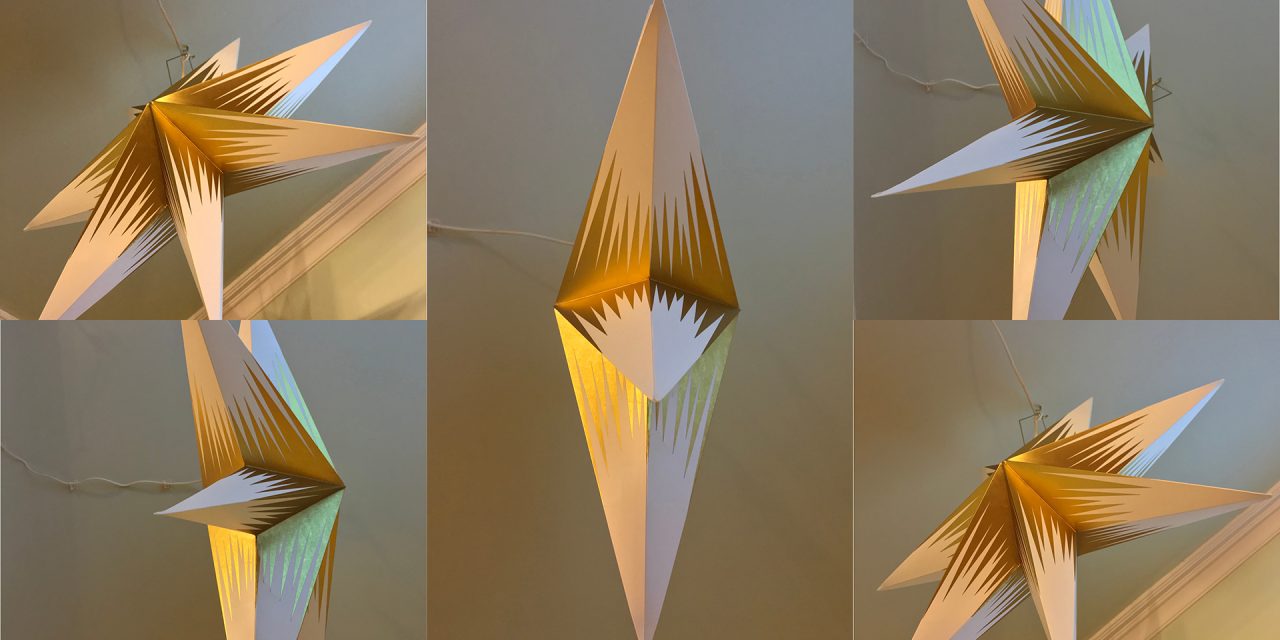My first Sunday back after quarantine, I sat in a daze on the pew in my Central Asian church. The IKEA Christmas star still hung suspended from the ceiling above the baptismal in the corner. To my side, the audio-visual equipment that made our months-long online meetings possible overwhelmed the narrow aisle of the small sanctuary with its cables and devices. Around me, church members sat carefully distanced from one another. No one touched.
In dismay, my mind raced to find something relatable. It was like returning to the bedroom of a loved one who recently died. Or venturing out into the stillness of a neighborhood destroyed by a storm.
The star kept drawing my attention away from the sermon. It sure didn’t feel like Christmas. Sweat dripped behind my mask in the summer heat. The year was half over and the ornament seemed to mock us like a wedding ring of a deceased spouse laying on a bedside table. Look what you’ve lost. Look how your world changed.
It’s been a terrible year
There is no denying it—2020 has been a year many of us will be glad to see in the rearview mirror. The pandemic shattered any sense of safety or independence we may have felt. Those who haven’t been personally affected by COVID still experience its touch through emotions like fear, isolation, loss and helplessness.
Suicide and abuse are on the rise around the world. Economies are broken. Decent, hard-working people can’t find work to support their families. Humans created for relationship are grieving the loss of community. People have missed births, deaths, weddings and graduations. Friendships bear scars from divergent views about masks, hygiene and politics.
Many of my colleagues across Central Asia have incredible stories of God at work during COVID, but these aren’t my stories. Local friends have moved away. Others don’t answer messages. Some are afraid to socialize. Some have fallen away from the faith.
And it’s not just the pandemic. I may live in Central Asia, but I still read the news from the U.S. I am sick to see daily accounts of hatred, slander, violence and chaos. I love America, and I fear for its future.
There is a lot to lament this year, and I’ve certainly done my share.
Put your hope in God
That IKEA star still hangs in the corner of the church. I suppose by now it will stay up until December. I’m accustomed to it, though, and find a strange comfort in its presence. Just like the ancient star pointed the way to the baby Jesus, this cheap paper star points my heart to the risen Savior. He is still the “light to the nations” (Isaiah 42:6). He is the promised One who shone into my heart and gave me life. He is the one who suffered, died and rose from the dead just like He said He would. Because of Him, I can enter into the presence of God. He is the King who will come again in glory to take his children home.
The darkness did not overcome Christ, and it will not overcome me. I put my hope fully and finally in Jesus Christ.
Long for eternity
I sometimes feel like Central Asian believers are more prepared for days of suffering than Americans are. They write worship music with lyrics born from places of difficulty. One worship song has been particularly sweet to me these days. Here are the words:
Lord, reach your hand out when I fall
The waves are high and there is a storm
But my hope is in the Lord
I will trust your faithful words forever.
This world is nothing to me.
You are my portion, Lord Jesus
I live with hope that one day
I will sit across from you at your great table.
In a sense, that sad feeling of an empty wedding ring on the table is appropriate. Jesus said, “The time will come when the groom will be taken away from them, and then they will fast” (Matt. 9:15). Just like the ancient Jews waited for the coming of the Messiah, we wait for the coming of Jesus. We long for it so much our hearts sometimes physically ache.
These days at church, I pull aside my mask, sanitize my hands and take communion. I know this won’t last forever. We’re proclaiming Christ until He comes. On that day, we won’t need communion anymore because we’ll feast with Him at His table. We won’t need a lamp—or a star—because Jesus Himself will be our light (Rev. 21:23).
So until then, come what may, I’ll persevere in hope. I’ll trust and obey. I’ll seek the lost. I’ll share the gospel. I’ll wait expectantly for the day the brokenness will end and I’ll join every tongue and tribe and nation at the wedding feast of Jesus.
I know it will be worth it (Rom. 8:18).



